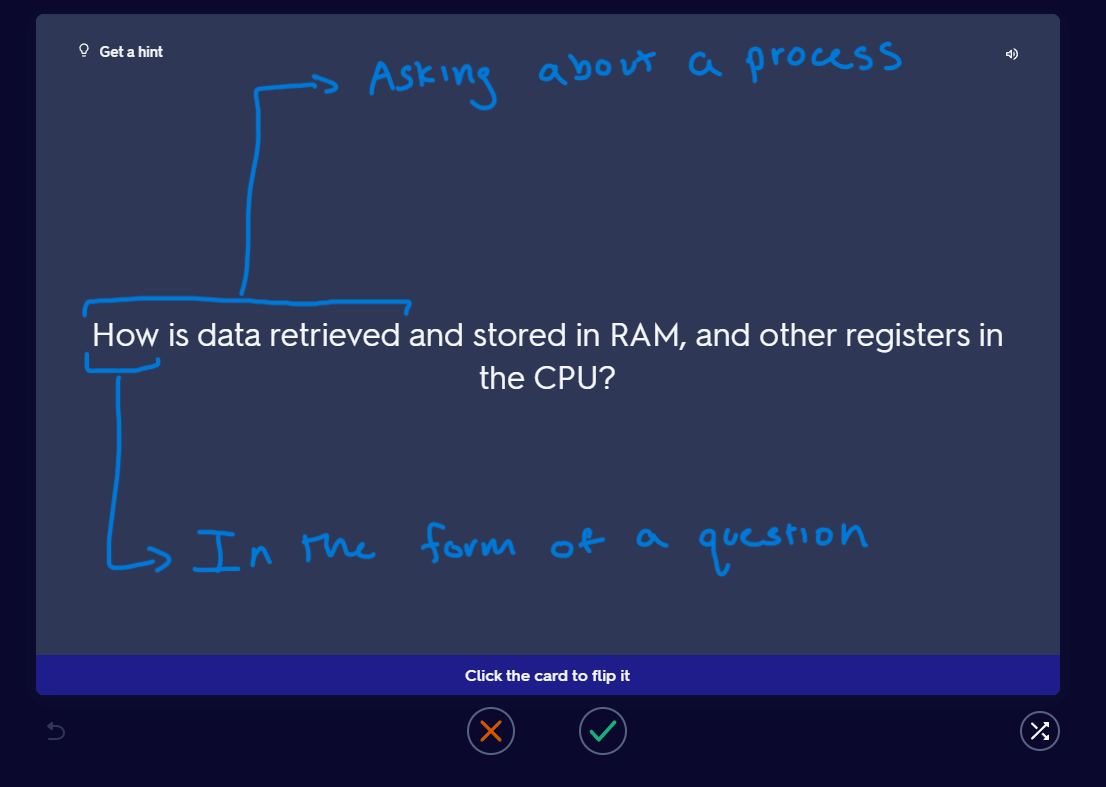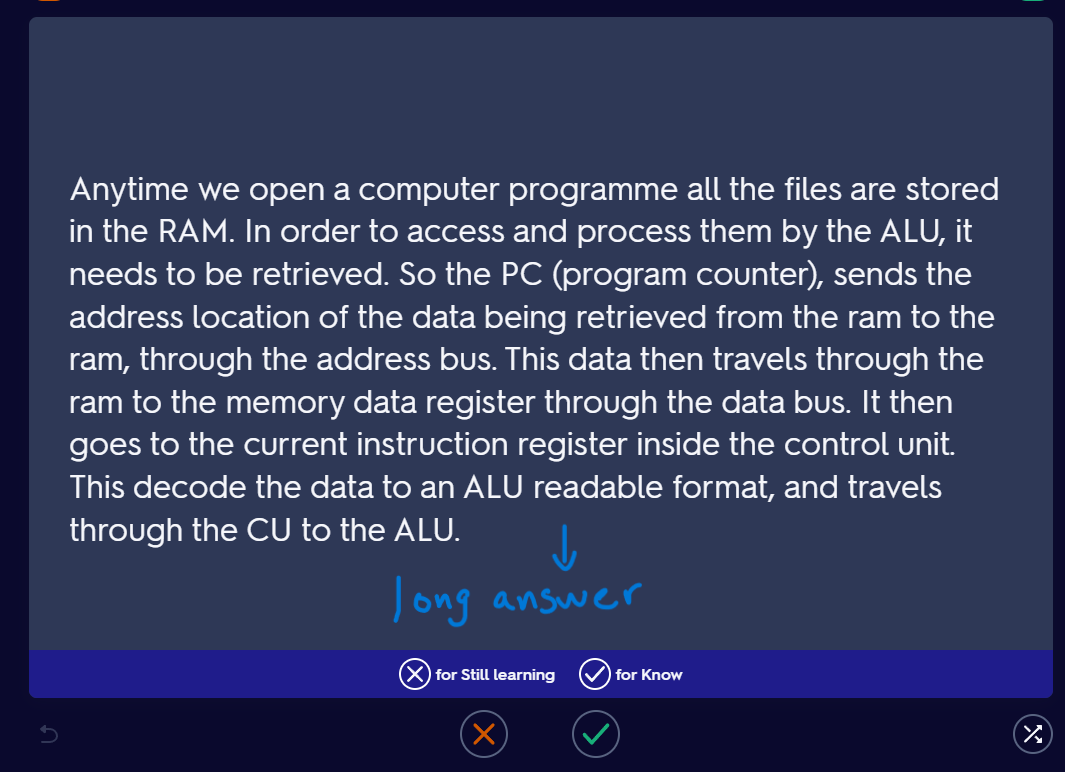
As an IBDP student, you are expected to learn and apply a lot of information for your exams and assessments. This can be challenging, especially when you have to deal with complex concepts and processes that are not easy to remember or understand.
How can you improve your memory and recall skills?
This article will share three proven strategies that help you do exactly that, and make your learning more effective and enjoyable in the process. Our additional suggestions on these strategies will also benefit your academic performance and confidence, beyond the conventional uses of these tips, optimizing how you study.
Table of Contents
- Introduction
- Tip 1: Flashcards (why theyre so great, and how you should use them)
- Tip 2: Teaching (who you should teach and how to make use of the technique)
- Tip 3: Mnemonics and Acronyms (examples and suggestions)
- Conclusion - A Recap
Using Flash Cards (Quizzlet / Alternatives)
Flash cards are cards that have a topic on one side and a description or answer on the other side. They help you memorize and recall concepts and processes by testing your knowledge and understanding. Flash cards are great because:
- Flash cards can be used to help study for virtually anything - review key terms, definitions, examples, diagrams, formulas, etc.
- Flash cards are quick and easy. If youre thinking about it, its probably been done before by other people. Because of this, you can very easily find other peoples study sets on topics that you need, and paste the ones that apply when creating yours for the ultimate study set.
- Flash cards are effective. According to a study by Roediger and Karpicke (2006), students who used flashcards to test themselves on the material retained more information than those who only studied the material without testing.
And while there are multiple ways to use flash cards, here are a few musts to make the best use of your flashcards:
- Use more than just key terms/ definitions on your flash cards. Include processes, scenarios, comparisons, or applications that require you to think and explain your answer.
- This leads to the second point, do not shy away from writing long answers or explanations in your flashcards.
- Write your topic in the form of a question, as if they were on the exam paper. For example, instead of “Secondary Memory”, write “What is secondary memory? What differentiates it from primary memory?”, with a long answer. You may even want to look at past paper questions and add the common ones from a specific unit.
- Ask questions that require you to give an overview or a summary of the topic, for topics that involve order, structure, or function. For example, instead of asking specific questions on parts of the digestive system, ask yourself the bigger picture questions that ensure concept clarity, such as “What is the flow of food through the digestive system in the human body? Identify the name and function of the organs as you describe it”.
Here is an example from computer science that synthesizes all the key points:


I also suggest creating quizlets based on units or very specific sections of them, that allow you to study particular topics at a time and do not overwhelm your mind.
If you have Quizlet premium, or a similar tool, you can also use games and activities that make flash cards more fun and interactive, but whats most recommended is to use the learn mode. Keep repeating the flashcards till you can confidently answer them without hesitating, and only then, move them to the learned pile.
Lastly, we highly suggest getting the app on your phone. This is the kind of studying you can do while on the bus ride back home, in the bathroom, etc, which is quite simple, short, but most importantly very effective. Its perfect for testing and improving your recall ability and long-term memory growth.
Teaching the Learned Content
Teaching what youve learned is a technique as old as time itself. It's a strategy that ensures that not only do you remember and recall information accurately, but that you also have a complete grasp on the topic, by being able to explain it to someone else with little to no prior understanding of the topic.
Teaching reinforces your understanding, identifies your gaps, and organizes your thoughts. When you teach the learned content, you should try to make it as clear and understandable as possible, using examples, analogies, stories, or visuals that can help you and your audience grasp the concept. By doing so, it can help you create unique and easily recallable connections between the information you taught with the analogies you used in the past, and the way you presented it, helping you remember the concepts you need much faster and with more clarity.
What we recommend is to teach yourself. Pull out a whiteboard, online, virtual, even a piece of paper, and record yourself teaching a concept in the way you understand it, much like the educational videos we find on youtube. This is multipurpose, as not only do you work on teaching the concept, but when in need of a recap a couple weeks in the future (even months) the video will always come in handy.
Use of Mnemonics and Acronyms
Mnemonics and acronyms are memory devices that help you remember specific information by using words, letters, or sounds that are easy to recall.
For example, MRS G CHEN is a mnemonic that helps you remember the different types of energy:
- M : Mechanical
- R : Radiant
- S : Sound
- G : Gravity
- C : Chemical
- H : Heat
- E : Electrical
- N : Nuclear
Similarly, MRS CHEN is an acronym that helps you remember the characteristics of living organisms: Movement, Respiration, Sensitivity, Cellularity, Homeostasis, Excretion, and Nutrition.
Mnemonics and acronyms can help you memorize and recall information that is related to one another, such as processes, methods, categories, or sequences. You can use mnemonics and acronyms that are already available, or you can create your own based on your preferences and associations.
They are specifically helpful and useful when asked for pros and cons, as they give you the key considerations for their evaluation. A great example can be GDP in economics, where SPICED Q is a mnemonic commonly used to remember the cons of GDP.
Conclusion
In this article, I have shared three proven strategies that can help you boost your memory and recall skills for your IBDP subjects: making flash cards, using mnemonics and acronyms, and teaching the learned content. These strategies will help you store and retrieve the information you need for your IBDP subjects in a more efficient and enjoyable way.
They will also benefit your academic performance and confidence, as you will be able to demonstrate your knowledge and understanding in various situations. I hope you found this article helpful and informative, and I encourage you to try these strategies and see how they work for you. If you have any other tips or experiences that you would like to share, please feel free to leave a comment below.